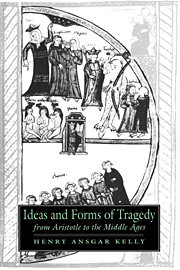4 - The twelfth-century scene
Published online by Cambridge University Press: 22 September 2009
Summary
In this chapter we shall be studying the ideas of tragedies that emerged during the “renaissance of the twelfth century.” This rebirth of classical learning was not only short-lived, but also narrow-placed, being restricted mainly to France and England. Many of the advances made in literary knowledge did not survive as general knowledge through the next century, but some fragments did achieve a later resurrection. There were also some highly influential new formulations of older medieval ideas which were completely untouched by new acquaintance with the classics.
WILLIAM OF CONCHES AND THE COMMENTARIES ON BOETHIUS
Boethius's Consolation of Philosophy provided a particularly important channel for traditions of learning. Unfortunately, many of the medieval commentaries on Boethius remain unedited and even unsorted, so that whatever is said here on the matter must necessarily be provisional.
We have looked at versions of commentaries associated with Remigius of Auxerre around the beginning of the tenth century, and we have also examined Notker's translation. There were other Carolingian commentaries on the Consolation, but Remigius was by far the most important. Remigian commentaries continued to be copied and modified during the eleventh century, and they exerted influence on later efforts.
Of the several new commentaries produced in the twelfth century, the most important was that of William of Conches (c. 1090–c. 1155), written around the year 1125 when he had finished his own education at Chartres and begun his teaching career.
- Type
- Chapter
- Information
- Ideas and Forms of Tragedy from Aristotle to the Middle Ages , pp. 68 - 110Publisher: Cambridge University PressPrint publication year: 1993



